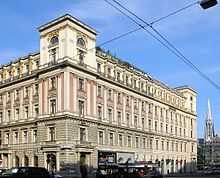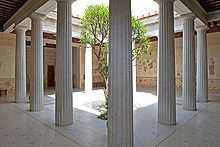Ephrussi family



The Ephrussi family (French pronunciation: [ɛfʁysi]) were a Russian Jewish banking and oil dynasty.[1]
Family members made their fortune controlling grain distribution beginning in Odessa (then Russian Empire, now Ukraine)[1] and later controlled large-scale oil resources across Crimea and the Caucasus. From 1856, members of the family established banking houses in Vienna, Paris, and Athens. By 1860 the family was the world’s largest grain exporter.[1] The Austrian branch of the family were elevated to the nobility by the Habsburg emperor.
During the 19th century, the family possessed vast wealth, owning many castles, palaces, and estates in Europe. The family were known for their connoisseurship, intellectual interests, and their huge collections of art.[2]
The family's bank and properties were seized by the Nazis after the March 1938 German annexation of Austria.[1]
The family name is considered to be a variation of "Ephrati", a Jewish family name attested in various countries since the 14th Century and still current in present-day Israel, in this case transformed through the Ashkenazi pronunciation (Ephrati-Ephrassi-Ephrussi).[3]
Notable members of the Ephrussi include:
- Béatrice de Rothschild-Ephrussi (1864-1934) - part of the Rothschild family
- Boris Ephrussi (1901-1979), influential French geneticist (his wife, Harriett Ephrussi-Taylor, 1918-1968, was also a geneticist and crystallographer)
- Charles Ephrussi (1849-1905), art historian, proprietor of the "Gazette des Beaux-Arts", an inspiration for Charles Swann in Marcel Proust's À la recherche du temps perdu
- Ignace von Ephrussi (1829-1899), Austrian banker
- Jules Ephrussi (1846-1915), French banker
- Marie Juliette Ephrussi, Princesse de Faucigny-Lucinge, (1880-1964) - Princess de Faucigny-Lucinge
- Maurice Ephrussi (1849-1916), French banker
- Michel Ephrussi (1845-1914), French banker
- Viktor von Ephrussi (1860-1945), Austrian banker
- Elisabeth von Ephrussi (1899-1991)
- Gisela von Ephrussi (1904-1985)
- Ignace von Ephrussi (1906-1994)
- Rudolf von Ephrussi (1918-1971)
- Robert de Waal
- Victor de Waal (*1929), Dean of Canterbury
- Constant Hendrik de Waal (*1931)
- John de Waal (*1962), British barrister
- Alexander de Waal (*1963), British writer and journalist, Executive director of World Peace Foundation
- Edmund de Waal (*1964), British ceramic artist, Author of The Hare with Amber Eyes
- Thomas de Waal (*1966), British journalist
- Hendrik de Waal (*1955), Dutch investor
Properties included:
- Palais Ephrussi is a Ringstraßenpalais - Vienna.
- Villa Ephrussi - Saint-Jean-Cap-Ferrat on the Côte d'Azur[4]
- Hôtel de Breteuil, 12 Avenue Foch, Paris
- Hôtel Ephrussi, 81 Rue de Monceau, Paris
- Hôtel 11, Avenue d'Iéna, Paris
- Villa Kerylos on the Côte d'Azur
Other Ephrussi
- Boris Ephrusi (1865, Kishinev - 1897, San Remo) — Russian economist and journalist, member of the Russkoye Bogatstvo monthly magazine, brother of Perla Ephrussi and Zinaida Michnik (Ephrussi).
- Perla Ephrussi (also Paula and Polina Ephrussi, 1876, Kishinev - 1942, Pyatigorsk) — Russian educational psychologist.
- Zinaida Michnik (Ephrussi) (1878, Kishinev - 1942, Pyatigorsk) — Soviet pediatric researcher.
- Yakov Ephrussi (Russian: Яков Исаакович Эфрусси, 1900, Odessa - 1996, St. Petersburg) — Soviet engineer, innovator in the field of television technology, nephew of Zinaida Ephrussi and Perla Ephrussi.
The Hare with Amber Eyes
The Hare with Amber Eyes (2010) is a family memoir of the Ephrussi family by British ceramicist Edmund de Waal, whose grandmother was Elisabeth Ephrussi of that family (see above).
References
- ↑ 1.0 1.1 1.2 1.3 'Hare' chronicles unheard of Jewish family, The Jewish Chronicle of Pittsburgh (6 September 2011)
- ↑ De Waal, Edmund (2010). The Hare with Amber Eyes. Chatto & Windus. ISBN 0-7011-8417-5.
- ↑ Dan Rottenberg, "Finding our fathers: a guidebook to Jewish genealogy", 1986
- ↑ Grand fortunes: dynasties of wealth in France, (Algora Publishing, 1998), By Michel Pinçon, Monique Pinçon-Charlot, Andrea Lyn Secara, page 124